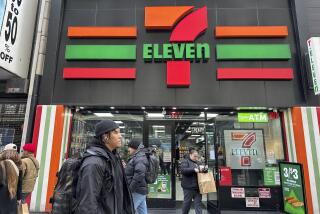Gateway Weighs Bid From Investor
- Share via
Is the cow already out of the barn at Gateway Inc.?
Two days after an activist investment group said it had bought a 10% stake, the Irvine computer maker said Wednesday that its fourth-largest shareholder had made an unsolicited bid for the entire company.
Both the suitor and the investor group believe that Gateway is worth more than its share price suggests.
But some analysts question whether it’s too late to turn around the company famous for its black-and-white cow-spot packaging. Once considered a rival to industry leader Dell Inc., Gateway these days ranks a distant third in PC sales after Hewlett-Packard Co.
“There’s a lot of value in this company that seems really hard to unlock,” Forrester Research Inc. analyst Ted Schadler said.
Nonetheless, Lap Shun “John” Hui offered to buy Gateway’s retail operations for $450 million or to negotiate a deal for the entire company. Gateway shares, already bolstered by news of the new investor group, rose 23 cents, or 13%, Wednesday to $1.95. That values the company at $725.3 million.
EMachines co-founder Hui owns a 5% stake in Gateway as a result of selling the company to Gateway in 2004. In a letter Monday to the board, Hui said Gateway should sell its professional and direct-sales operations, which have been “disappointing at best.”
“I believe that management and the board need to adopt a sense of urgency to address Gateway’s problems,” he wrote. “The landscape of the PC business has continued to evolve rapidly, and Gateway has not reacted.”
Hui on Wednesday declined to comment beyond the letter.
Gateway said it would review his offer with its financial and legal advisors before responding.
The bid is separate from efforts by a New York investor group that acquired a 10% stake in the company. The group, consisting of Harbinger Capital Partners and Firebrand Partners, is working with management to improve profit margins and recruit a new chief executive, a vacant position Gateway hopes to fill in the next two months.
“The basic question is: Does Gateway want to sell?” said analyst Charles Smulders of research firm Gartner Inc. “One possibility would be to break up the company, but you have to have buyers for the other parts.”
Ted Waitt, who founded Gateway in an Iowa farmhouse in 1985 and left as chairman last year, owns 20% of the company and would have considerable influence on a decision, he said.
Once a mainstay, Gateway earned high marks for selling customized computers and providing knowledgeable service from a friendly staff.
Mark Alger, a small shareholder who lives in Michigan, said he had been frustrated with Gateway’s stock performance and management’s inability to move the company in the right direction. He would not say how many shares he holds.
“It’s a real dog,” he said of the stock. “It’s very frustrating for shareholders.”
Alger, who left commercial real estate to invest in the stock market full time, said he urged Gateway to sell in early 2005 when its shares were trading around $5, but a director he wouldn’t identify told him that the company wanted to spur growth instead.
The stock price had sunk to $1.30 by mid-August.
Gateway sells its flagship machines online, over the phone and through a few national chains -- particularly Best Buy Co. -- and sells the cheaper EMachines brand through a variety of retail outlets.
In desktop PCs, Gateway controls 15% of the market, behind Dell at 30% and HP-Compaq at 26%, Schadler of Forrester Research said.
Shipments in the second quarter rose 6% from a year earlier but were down 15% from the first three months of this year, Gartner’s Smulders noted. Falling margins from its retail business and slowing sales on the Internet and to commercial customers combined to give the company a second-quarter loss of $7.7 million, compared with a $17.2-million profit in last year’s second quarter. Revenue rose 5.2% to $919.3 million.
Schadler said Gateway had not focused on a market niche and had not looked closely enough at customer profiles. “It needs a deeper understanding of who its customers are,” he said.
He and Smulders said selling the company in pieces could garner higher values but that such a strategy wasn’t necessarily the best answer.
“They clearly need a strategic direction,” Smulders said. “They need to bring in someone with fresh thinking.”
Firebrand principal Scott Galloway said Gateway should hold on to its direct sales and professional sales markets.
“The majority of great brands are in multiple channels,” he said. “Consumers want brands that are accessible.”






